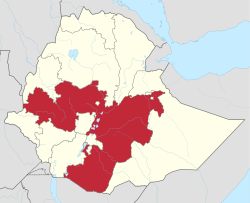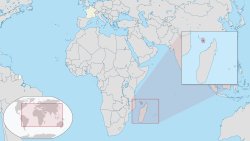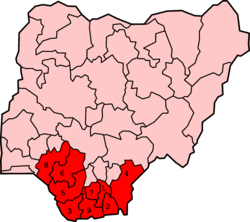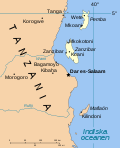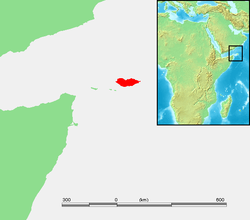List of active separatist movements in Africa Last updated January 30, 2026 Criteria What is and is not considered an autonomist or secessionist movement is sometimes contentious. Entries on this list must meet three criteria:
They are active movements with active members. They are seeking greater autonomy or self-determination for a geographic region (as opposed to personal autonomy ). They are citizens/people of the conflict area and do not come from another country. Under each region listed is one or more of the following:
De facto state (de facto entity): for unrecognized regions with de facto autonomy.Proposed state: proposed name for a seceding sovereign state. Proposed autonomous area: for movements towards greater autonomy for an area but not outright secession. Botswana Map of Zambesia Ngamiland
Ethnic group: Masubia , Nzanza , Mbowe , Makalahari, MaYeyi , Mampukushu, Makwengari, Mambunda, Matotela, Batoka , Mafwe , Barotse , Leya , Nanzwa , Lujana, Dombe North-West District [ 21] [ 22]
Kgatleng District [ 23]
Ethnic group: Bakgatla people Proposed: full restoration of the Bakgatla Reserve as an autonomous region or independence [ 24] North-East District [ 25] [ 26]
Mauritania Northern Mauritania [ 102]
Ethnic group: Beidane Proposed: independence for Northern Mauritania Eastern Mauritania [ 103]
Proposed state or autonomous region: Atmoulay or unification with Mali Morocco Rifian speaking regions of Morocco (yellow) Rif
Started in Morocco during the 1920s, [ 110] [ 111] and was revitalized in 2013. [ 112] The Rif Independence Movement is a charter member of the Organization of Emerging African States. [ 112]
Souss-Massa [ 113]
Namibia Map of the Caprivi Caprivi Strip
Ethnic group: Masubia , Nzanza, Mbowe , Makalahari, MaYeyi , Mampukushu, Makwengari, Mambunda, Matotela, Batoka , Mafwe , Barotse , Leya , Nanzwa , Lujana, Dombe Rehoboth area
Tsumkwe Constituency [ 120]
Ethnic group: Juǀʼhoansi people Bwabwata National Park [ 121]
Ethnic group: Khwe Proposed: autonomy for the Khwe Notes ↑ Khoi-San is a charter member of the Organization of Emerging African States References ↑ Young, Grace. "Kabyle people" . Encyclopaedia Britannica . ↑ The 2nd Kabylian Movement for Self-Determination Congress (10 December 2011). "Kabylian Movement for Self-Determination Status" (PDF) . pp. Art. 19. 21. 22. 23. Archived from the original on May 16, 2017. ↑ Ferhat Mehenni. "Blog de Ferhat Mehenni" . Le site officiel des Souverainistes Kabyles (in French). Archived from the original on November 13, 2016. ↑ Mouvement pour l'Autodétermination de la Kabylie. "Bienvenue sur le site officiel des Souverainistes Kabyles" (in French). Archived from the original on October 12, 2002. ↑ Merezak, Houda (2021-08-30). "The Movement for the Self-Determination of Kabylia (MAK)" . Morocco World News . Retrieved 2023-04-10 . 1 2 3 4 5 6 7 8 "OEAS Member-States" . 9 May 2024. ↑ "OEAS Member-States" . ↑ "Half of those questioned about Lunda Tchokwe Protectorate say they want autonomy" . VerAngola . 14 October 2024. ↑ "Separatistas anunciam criação da República da Lunda Tchokwe" . 6 October 2023. ↑ Burnett, M. Troy, ed. (2020). "Angola". Nationalism Today: Extreme Political Movements around the World . Vol. 1. Santa Barbara, California: ABC-CLIO. pp. 63– 78, pages 77–78 . ISBN 978-1-4408-5000-4 ↑ Bento, Lourenço (6 August 2019). "Manifesto Jurídico Sociológico Do Povo Lundês, Lança Livro Sobre Estado" . Kwacha UNITA Press (KUP) (in Portuguese). Archived from the original on 3 January 2020. ↑ Minahan, James B. (2016). "Lunda-Chokwe". Encyclopedia of Stateless Nations: Ethnic and National Groups around the World . Santa Barbara, California: Greenwood. p. 492 . ISBN 978-1-61069-954-9 ↑ Kangandjo, Isidro (3 March 2021). "Presidente do Manifesto Jurídico e Sociológico do Povo Lunda-Tchokwé avisa o governo do MPLA" . Factos Diários (in Portuguese). Archived from the original on 16 May 2022. ↑ "Afinal, o que se passa em Cabinda?" . Deutsche Welle . ↑ "Front for the Liberation of the Enclave of Cabinda" . GlobalSecurity.org. Retrieved 2009-04-10 . ↑ "Cabinda disconnected from Angola will be absorbed by other states, says researcher" . 19 February 2024. ↑ "M'banza Kongo: Cresce movimento que defende retoma da figura do "Rei do Reino do Congo" . 1 2 "UNPO: Zambesia" . unpo.org . Retrieved 2022-12-28 . 1 2 "UNPO: Zambesia: UNPO condemns oil and gas company ReconAfrica's interest in exploiting resources of the Kavango Basin" . unpo.org . 2 November 2009. Retrieved 2022-12-28 . ↑ "Moremi against secession of Ngamiland from Botswana" . Moremi against secession of Ngamiland from Botswana . 2015-01-15. Retrieved 2023-05-25 . ↑ "How To Alleviate Struggle Of Basarwa In North West!" . 16 June 2025. ↑ "Gov't to comprehensively examine Basarwa situation" . 17 March 2025. ↑ "Bakgatla contradict Kgafela II" . 13 March 2022. ↑ "Kgafela II trashes Constitutional Review" . 9 March 2022. ↑ "Bakalanga "demand own tribal territory" . 26 May 2024. ↑ "Bakalanga call for Bukalanga Tribal Territory" . 27 May 2024. ↑ "Burundi's Indigenous Twa Push for Equity in Politics and Education Ahead of 2025 Elections" . 21 December 2024. ↑ "Ambazonia: Africa's Hidden Crisis" . 15 April 2024. ↑ Nshom, Elvis (2025). "Ambazonian or Cameroonian? Perceived Discrimination and National Identification Among Anglophones in Cameroon" . Social Sciences . 14 (6): 375. doi : 10.3390/socsci14060375 . ↑ Official Website of the Government of the Federal Republic of Ambazonia (2016). "Government of Ambazonia" . Government of Ambazonia Official Website. Retrieved December 26, 2017 . ↑ Lekunze, Manu (17 March 2024). Fatade, Wale (ed.). "Cameroon's rebels may not achieve their goal of creating the Ambazonian state – but they're still a threat to stability" . doi :10.64628/AAJ.fd7nssukr . ↑ "Southern Cameroons National Council plans street protests to have activists freed" . The Post News. 2005-11-27. Archived from the original on 2016-08-16. Retrieved 2009-04-10 . ↑ "Rebels Declare 'Independence' Of Bakassi" . Up Station Mountain Club . ↑ "Understanding Boko Haram Terrorism and Insurgency" (PDF) . ↑ "Sokols quer CMSV transformada em "Governo Regional" para combater desequilíbrio e injustiça em Cabo Verde" . 5 July 2021. ↑ "UCID vai entregar brevemente no parlamento uma proposta de lei sobre a regionalização". ↑ "Central African Republic rebels declare autonomous state in north" . The Washington Post . 15 December 2015. Retrieved 20 December 2015 . ↑ Chris Roth (28 April 2014). "Springtime of Nations" . Retrieved 23 October 2014 . ↑ Dembassa-Kette, Crispin. "Rebel declares autonomous state in Central African Republic" . af.reuters.com . Archived from the original on 23 April 2017. ↑ Vries, Lotje de; Schomerus, Mareike (2024). "Hau: Journal of Ethnographic Theory . 14 (3): 619– 628. doi :10.1086/733129 . 1 2 Walle, Nicolas van de (8 December 2020). "The Value of Disorder: Autonomy, Prosperity, and Plunder in the Chadian Sahara" . Foreign Affairs . Vol. 100, no. 1. ↑ "A forsaken people" . 2 September 2020. ↑ "(Congo-Brazzaville) Etat du Sud-Congo : drapeau, devise, armoiries et limites géographiques" . 16 September 2014. ↑ "The Republic of Kivu: A Path to Peace or a Pandora's Box?" . 24 June 2025. ↑ "The Birth of Kivu Republic: A New Chapter in African Geopolitics" . 11 April 2024. ↑ "Imposing Sanctions on Coalition of Armed Groups in the DRC" . ↑ "Indigenous Batwa win human rights victory over eviction from DRC park" . 2 August 2024. ↑ "The "Balkanization" of the democratic Republic of Congo" (PDF) . ↑ "Mongala" . ↑ "The Afar "Triangle": A New Epicenter of Tension in the Horn" . ↑ "Between Geopolitics and Repression: The FRUD's Armed Struggle for Justice in Djibouti" . 11 April 2025. ↑ https://www.tigraionline.com/articles/agazian-movement-tegaru.html ↑ https://www.theafricareport.com/53978/eritreans-caught-in-dilemma-over-tigray-conflict/ ↑ Tesfanews (2013-09-09). "Two Ethiopia Sponsored Armed Groups Got Terrorist Status" . TesfaNews . Retrieved 2023-05-26 . ↑ "Saho Movement Leaders In Jail In Adi-Grat" . Awate.com . 2017-09-09. Retrieved 2023-05-26 . ↑ "Eritrean opposition says ready to attack government army" . Sudan Tribune . 2009-12-30. Retrieved 2023-05-26 . ↑ Negash, Beyan (2015-03-15). " . Awate.com . Retrieved 2023-05-26 . ↑ "Annobon Was Free a Century Before Haiti. Can It Find Independence Again?" . 9 June 2025. ↑ "Annobón, the African island requesting to become an associated state of Argentina: an unexpected geopolitical twist" . 31 May 2025. ↑ "News | Ambô Legadu" . www.ambolegadu.com . 2022-05-07. Retrieved 2024-04-09 . ↑ "Annobon's Road to Independence" . 30 December 2022. ↑ "La Declaración de Indpendencia de Annobón Sacude Guinea Ecuatorial" . asodeguesegundaetapa.org . ↑ "Ethiopia shaken by a new and growing rebellion in Amhara" . 15 August 2023. ↑ "Why Ethiopia's Amhara militiamen are battling the army" . 15 August 2023. ↑ "Q&A: Ethiopia's Afar region" . BBC News . 18 January 2012. ↑ "Political history of the Afar in Ethiopia and Eritrea" (PDF) . ↑ "Oromo Liberation Front Beliefs" . www.oromoliberationfront.org . OLF. Archived from the original on 13 December 2018. Retrieved 8 December 2018 . ↑ Dube, Nagessa (3 August 2020). "Guji Oromo need freedom from liberators" . Ethiopia Insight . Archived from the original on 22 March 2021. Retrieved 22 March 2021 . ↑ OLF-OLA (23 January 2023). "A Brief Political Manifesto: From Armed Struggle to the Prospect for Peace" (PDF) . Archived (PDF) from the original on 24 January 2023. Retrieved 23 January 2023 . ↑ Temare, Getachew Gebrekiros (28 September 2019). "The Republic of Tigray? Aydeln, yekenyeley!" . Retrieved 14 October 2020 . ↑ Asefa, Abraham (22 August 2020). " . Retrieved 14 October 2020 . ↑ "Politique. Quand Mayotte deviendra département..." Archived from the original on 2010-09-14. Retrieved 2010-07-28 . ↑ "A la une" . ↑ "Ga/Dangme States unite under one umbrella to administer their lands and heritage" . 5 January 2024. ↑ "Ga-Dangme Lands Administration Declares State of Emergency over Land Disputes in Greater Accra Region" . 28 October 2024. ↑ "North Mo Chiefs petition President for autonomy" . November 2024. ↑ Kantai, Parselelo (17 May 2012). "Kenya's Mombasa Republican Council : The Coast calls for freedom" . The Africa Report . Jeune Afrique Media Group (JAMG). Archived from the original on 10 October 2022. ↑ Torres, Luc; et al. (6 September 2012). "The separatist map of Africa: interactive" . The Guardian . Retrieved 23 October 2014 . ↑ Mwangi, Wachira (30 June 2022). "Puzzle of 81 suspects arrested in Mtwapa over MRC links" . The Daily Nation . Archived from the original on 30 June 2022. ↑ Mbaku, John (8 June 2023). Maina, Julius; Gacheche, Kagure (eds.). "Kenya's opposition wants to split up the country – but secession calls seldom succeed" . doi :10.64628/AAJ.exxd3nn77 . ↑ "NASA Supporters Unveil "Peoples Republic of Kenya" Flag" . ↑ "Azimio to push for secession in battle with Ruto as talks stall" . 27 May 2023. ↑ "Raila Criticised for Threatening Ruto with Secession Ultimatum - Kenyans.co.ke" . 27 May 2023. ↑ "Is the Somali government fueling secessionist agenda in Northern Kenya?" . Archived from the original on 5 October 2022. ↑ Fanou, Juste. "Old People: Out! Zouglou and Coupé-Décalé as hymns of social resistance in Côte d'Ivoire" . ↑ "Liberia: NAMSAL Threatens to Secede Muslim Territories" . ↑ Cousins, Michel (2013-06-01). "Cyrenaica federalists declare self government on 64th anniversary of Emirate of Cyrenaica independence" . LibyaHerald . Retrieved 2023-04-09 . ↑ Hüsken, Thomas; Obeidi, Amal S. (2022). "Cyrenaica Contemporary: Politics, Identity, and Justice in Times of Transition" . Local Self-Governance and Varieties of Statehood . Contributions to Political Science. pp. 177– 192. doi :10.1007/978-3-031-14996-2_9 . ISBN 978-3-031-14995-5 ↑ "Young and Angry in Fezzan: Achieving Stability in Southern Libya through Greater Economic Opportunity" . ↑ "Libya's Amazigh demand greater political representation" . 24 August 2025. ↑ "Malawians Give Mixed Reactions On Secession" . All Africa . ↑ "North Malawi independence: Yes, secession is good - Malawi Nyasa Times - News from Malawi about Malawi" . www.nyasatimes.com . 2014-09-16. Retrieved 2024-09-11 . ↑ "Calls for North Malawi to be State attracts mixed views: UDF blast PP - Malawi Nyasa Times - News from Malawi about Malawi" . www.nyasatimes.com . 2014-08-19. Retrieved 2024-09-11 . ↑ "Bulgarian Declares Mass of Floating Pumice off New Zealand Principality of New Atlantis" . Archived from the original on September 11, 2024. ↑ "Mzomera says North Malawi independence campaigners to hold demo - Malawi Nyasa Times - News from Malawi about Malawi" . www.nyasatimes.com . 2014-09-16. Retrieved 2024-09-11 . ↑ "Mzimba chiefs reject Lands Act, claim kingdom identity" . 8 December 2024. ↑ "State ordered to submit disclosures in Wandale case" . 9 August 2022. ↑ Roux, Pauline Le. "Confronting Central Mali's Extremist Threat" . Africa Center for Strategic Studies . Retrieved 2024-08-11 . ↑ Canada, Public Safety (2018-12-21). "Currently listed entities" . www.publicsafety.gc.ca . Retrieved 2024-08-11 . ↑ "National Counterterrorism Center | FTOs" . www.dni.gov . Retrieved 2024-08-11 . ↑ Femmes d'Afrique et émancipation ISBN 978-2-8111-1936-2 ↑ "تصنيف البوليساريو إرهابية: خطوة استراتيجية لحماية موريتانيا من الإرهاب والانفصال إقرأ المزيد" . 18 September 2025. ↑ "اكس ولد اكس اكرك يكتب : أجندة التشظي" . ↑ "Cry Freedom: Rodrigues Island: Case for Self-Determination" . 4 March 2016. ↑ Shan (6 April 2022). "Self-determination, a reality or myth for Agaleans and Rodriguans?" . Rising Ocean . ↑ "« Nou pou fer tou seki kapav pou ed Agalega », rassure Paul Bérenger" . 4 April 2025. ↑ Yabiladi.com. "From Algiers, Rif separatists reach out to Polisario" . Archived from the original on 2024-08-22. Retrieved 2025-01-05 . ↑ Faouzid, Adil (5 March 2024). "Algeria's Deep-Seated Hostility Against Morocco's Territorial Integrity Continues" . www.moroccoworldnews.com . Retrieved 2025-01-05 . ↑ Saada, Hana (2024-04-21). "A Step Towards Independence: Rif Flag Flies at UN Headquarters" . Dzair tube en . Retrieved 2025-01-05 . ↑ Peiró, Eva Woods (2012). White Gypsies: Race and Stardom in Spanish Musical Films 46. ISBN 978-0-8166-4584-8 ↑ Polk, William Roe (1952). "What the Arabs Think" . p. 52. 1 2 "The Rif Independence Movement Joins OEAS" . Scribd . Retrieved 31 July 2017 . ↑ "Against a backdrop of systemic dispossession, colonial-era laws, and mounting climate pressures, the Amazigh people of Morocco's Souss Massa region face increasing threats to their ancestral lands" . ↑ "Mozambique: Renamo Submits Its Autonomy Bill" . ↑ Forrest, Joshua B. (2003). Subnationalism in Africa: Ethnicity, Alliances, and Politics . Lynne Rienner Publishers. p. 188. ISBN 1-58826-227-8 ↑ "Caprivi Liberation Front" . Federation of American Scientists. Retrieved 2009-04-10 . ↑ "UNPO: Rehoboth Basters: Keeping the Culture Alive" . unpo.org . 2 November 2009. Retrieved 2022-12-03 . ↑ "UNPO: Rehoboth Basters: Post-Colonial African Independence Movements Quashed" . unpo.org . 2 November 2009. Retrieved 2022-12-03 . ↑ "UNPO: Rehoboth Basters" . unpo.org . 9 May 2024. ↑ "Justice delayed is justice denied: San land rights in Tsumkwe District" . 11 January 2023. ↑ "Constitutional and Legal Affairs Committee meets the Hambukushu, Khwe communities" . ↑ "Tuareg Separatist Militants Form an Alliance Against Junta-Led Governments in Mali and Niger" . Foreign Military Studies Office . 7 December 2024. ↑ "Voice of Biafra International" . www.biafraland.com . Retrieved 31 July 2017 . ↑ "UNPO: UNPO Welcomes 5 New Members!" . unpo.org . 2 November 2009. Retrieved 2022-04-14 . ↑ "Oduduwa Grand Alliance For Independence, OGAFI" . Retrieved 2020-07-11 . ↑ "Home" . Indigenous Peoples Union of Niger Delta. Retrieved 2 October 2022 . ↑ Minahan, James B. (2016). "Urhobo". Encyclopedia of Stateless Nations: Ethnic and National Groups around the World . Santa Barbara, California: Greenwood. p. 442–443 . ISBN 978-1-61069-954-9 ↑ Hazen, Jennifer M.; Jonas, Horner (2007). Small Arms, Armed Violence, and Insecurity in Nigeria: The Niger Delta in Perspective . Geneva, Switzerland: Small Arms Survey , Graduate Institute of International and Development Studies. p. 127. ISBN 978-2-8288-0090-1 JSTOR resrep10752 . ↑ Bamidele, Seun (2017). "The Resurgence of the Niger-Delta Avengers (NDAs) Group in the Niger-Delta Region of Nigeria". International Journal on Minority and Group Rights . 24 (4): 537– 552. doi :10.1163/15718115-02404003 . JSTOR 26557931 . ↑ Hazen & Jonas 2007 , p. 123 ↑ "The group stated that its mission was to secede from Nigeria." Adunbi, Omolade (2022). "Flames of Wealth: Crude Enclaves and Imitative Technologies of Extraction". Enclaves of Exception: Special Economic Zones and Extractive Practices in Nigeria . Bloomington, Indiana: Indiana University Press. pp. 133– 165, page 135 . ISBN 978-0-253-05956-7 ↑ "Separatist agitations in Nigeria: Causes and trajectories" . Brookings . ↑ "Political Autonomy for Nigeria's Ogoniland?" . 7 August 2012. ↑ "Group dissociates Benin Kingdom from separatist groups" . 7 November 2021. ↑ "Northern group calls for restructuring, new constitution" . 31 August 2024. ↑ Ahmadu-Suka, Maryam (5 March 2025). "Nigeria: Southern Kaduna to Submit Proposal for Creation of Gurara State" . Daily Trust . ↑ "Nigeria: Middle Belt Group Seeks Independence For Republic Of Takuruku" . The Trent . 3 February 2018. ↑ "Lamido Adamawa Secession Threat: Yorubas Want To Remain In Nigeria But We'll Not Be Threatened – Gani Adams" . 28 March 2014. ↑ "Efik Ethnic Group Serves Notice to Become a Sovereign State" . Archived from the original on 28 June 2014. ↑ "Assembleia Legislativa aprova programa do Governo da Região Autónoma de Príncipe" . 14 December 2022. ↑ "Ilha do Príncipe continua a lutar pela sua autonomia financeira" . 29 April 2024. ↑ "Mouvement des Forces Démocratiques du le Casamance (MFDC)" . GlobalSecurity.org. Retrieved 2009-04-11 . ↑ "Abdoul Akhat Ka : " Touba doit avoir son statut spécial pour assurer son autonomie " . ↑ Hoehne, Markus Virgil (2018-08-21), "Against the Grain: Somaliland's Secession from Somalia" , Secessionism in African Politics , Cham: Springer International Publishing, pp. 229– 261, doi :10.1007/978-3-319-90206-7_9 , ISBN 978-3-319-90205-0 , retrieved 2024-12-12 {{citation }}: CS1 maint: work parameter with ISBN (link ) ↑ Ahmed, Mohamed Omar (1 April 2024). "Puntland to Operate Independently from Somalia after Law Change" . Bloomberg News . Archived from the original on 1 April 2024. Retrieved 2 April 2024 . ↑ "Jubbaland Declares Independence From Somalia's Federal System" . ↑ "Breaking: Awdal announced it is breaking away from Somaliland" . 4 September 2023. ↑ "Analysis: The prospect of conflict in the Awdal region" . 28 September 2023. ↑ "SSC-Khatumo Joins Somalia's Federal Fold After Long Struggle" . Garowe Online . 2020-06-30. Retrieved 2025-11-05 . ↑ "SSC-Khaatumo Granted Seat at National Consultative Forum, Says Leader Firdhiye" . hornobserver.com . 2025-04-15. Retrieved 2025-11-05 . 1 2 "Cape Independence - CIAG - Let's Free The Cape!" . www.capeindependence.org . Retrieved 2021-07-18 . ↑ "Vryheidsfront Plus" . vfplus.org.za . Retrieved 2021-07-18 . ↑ "Cape Party still wants to 'free' Western Cape from rest of SA" . Retrieved 31 July 2017 . ↑ "CapeXit.org – Own your future – Eien jou toekoms" . Retrieved 2021-07-18 . ↑ Daniel, Luke (2018-07-18). "Khoisan Nation serves Cape Town parliament with eviction notice" . The South African . Retrieved 2023-05-23 . ↑ Cocks, Tim; Cocks, Tim (3 April 2025). "South Africa's white Afrikaner separatists want Trump's help to become state" . Reuters . ↑ "Ek is wit en trots daarop" . Mail & Guardian . 2008-10-12. Retrieved 2009-04-10 . ↑ Members: Afrikaner , Unrepresented Nations and Peoples Organization ↑ "Yual Chiek: "África debe volver a tener fronteras que sean sensatas para los africanos" . realpolitik.com.ar (in Spanish). Retrieved 2024-12-23 . ↑ Yual Chiek: "Es cuestión de tiempo para que Sudán del Sur explote" . Retrieved 2024-12-23 – via YouTube. ↑ "Separatismo en África: La agenda global ignorada" . realpolitik.com.ar (in Spanish). Retrieved 2024-12-23 . ↑ "Disparate dreams of Zande governance across the South Sudan-Central African Republic borderland" . doi :10.1086/733129 . 1 2 "Abyei demands self-rule as Sudan conflict stalls referendum" . ↑ "The Lado Enclave: Why the Equatoria Region May Secede from South Sudan" . ↑ Vega, Yurena (20 April 2024). "The independence movement of the Canary Islands is rejuvenated by tourismphobia" . Maspalomas24h . ↑ "Ceuta Ya! propondrá en el próximo Pleno convertir a Ceuta en Comunidad Autónoma" . 26 September 2023. ↑ "Ceuta Ya! defiende el paso a ser Comunidad Autónoma" . ↑ "Sudan or Chad? Why a Darfur sultan regrets a twist of colonial fate" . BBC News . 2022-05-30. Retrieved 2023-05-26 . 1 2 "بعد ذهاب جنوبه... هل ينفصل شمال السودان إلى دولتين؟" . رصيف22 (in Arabic). 2021-09-06. Retrieved 2023-05-26 . ↑ "Eastern Sudan rocked by protests and calls for independence" . Middle East Eye . Retrieved 2023-05-25 . 1 2 "Eastern Sudan's Beja threaten to take up arms against Khartoum - Sudan" . reliefweb.int . 2015-07-27. Retrieved 2023-05-25 . ↑ "دولة النهر والبحر: من مأمنه يؤتي المركز" . العربية . ↑ "جمهورية كاودا الديمقراطية" (in Arabic). ↑ "دعوات لحكم ذاتي وتحذير من "انفصال".. الجزيرة تتحرك بمواجهة الدعم السريع" . 6 March 2024. ↑ "NCP figure proposes semi-autonomy for Blue Nile" . 18 September 2012. ↑ "⭕عاجل كردفان الكبرى تطالب بدولة منفصلة" . تسامح نيوز . 25 July 2022. ↑ "Contagion of discontent: Muslim extremism spreads down east Africa coastline" . The Economist . 3 November 2012. ↑ " . ↑ "Tanzania: Six Members of Parliament Face Treason Charges" . ↑ "Togo-Attempt at secession in the East-Mono" . 14 September 2021. ↑ "شهود عيان: أهالي جزيرة جربة يدعون إلى انفصالهم عن تونس" . ↑ "Uganda's aggressive peace" . Eureka Street . 2008-10-13. Retrieved 2024-07-10 . ↑ "Demands for Federalism in Central Uganda" . 15 September 2020. ↑ "THE CASE FOR Federalism in the 21st Century: A Strategic Review of and New Manifesto to Guide the Struggle for Federalism in Uganda" (PDF) . ↑ Khisa, Moses; Rwengabo, Sabastian (2022). "The Deepening Politics of Fragmentation in Uganda: Understanding Violence in the Rwenzori Region" . African Studies Review . 65 (4): 939– 964. doi : 10.1017/asr.2022.80 . ↑ "We demand for Restoration and Recognition of Ankole Kingdom" . 19 March 2025. ↑ "Karamoja leaders ask Museveni to elevate area to regional status" . ↑ "President Museveni Engages King Oyo to Foster Development in Tooro Kingdom" . 16 May 2025. ↑ "UK to open negotiations over future of Chagos Islands" . BBC News . 2022-11-03. Retrieved 2023-05-23 . ↑ Revi, Vinitha. "Chaos over Chagos: Is the sovereignty dispute coming to an end?" . ORF . Retrieved 2023-05-23 . ↑ Wintour, Patrick (2022-11-04). "UK agrees to negotiate with Mauritius over handover of Chagos Islands" . The Guardian . ISSN 0261-3077 . Retrieved 2023-05-23 . ↑ "Chagos Islands All-Party Group: Reformation & Coordinator's Summary" . chagos-support . 2020-02-09. Retrieved 2023-05-23 . ↑ "UAE-backed Entity Calls for Self-Rule in Socotra" . 13 December 2024. ↑ "Barotseland kingdom seeks to leave Zambia" . BBC News . 29 March 2012. ↑ "Bembas Through Kola Foundation Starts Mobilizing For 2026 Presidential And General Elections" . 18 December 2023. ↑ "Kola Foundation has a political agenda - Kabuswe" . 21 December 2023. ↑ "Kola Foundation distractive to National Unity" . 19 December 2023. ↑ "One Zambia Two Laws of "Cuundu Caitwa" Legally Convened in 2015 While "Umodzi Kum'mawa Is Illegalised and Tribalised in 2023 – Kasebamashila Kaseba" . 18 December 2023. ↑ "Chuundu Caitwa asks President Lungu to fire Kambwili, Davies Chama and Mumbi Phiri" . 20 July 2015. ↑ "Umodzi Kumawa Forum Denounces Tribal Labels Amidst Political Condemnation" . 15 December 2023. ↑ "Zambia: South 'Secession' Exposed" . ↑ Magagula, David (28 December 2011). "Mthwakazi Liberation Front is 1 year old - Achievements and the road ahead" . Bulawayo24 News . Archived from the original on 9 January 2012. ↑ "Zimbabwe: The Mthwakazi Liberation Front (MLF), including structure, leadership, membership, objectives, activities, and areas of operation; treatment of members by authorities (2013-April 2018)" . Immigration and Refugee Board of Canada. 23 April 2018. Archived from the original on 4 July 2018. ↑ "Matabeleland Freedom Party" . Archived from the original on 19 March 2014. Retrieved 23 October 2014 . ↑ "Mthwakazi threat to take down Nehanda statue from Bulawayo arts centre" . Archived from the original on 28 October 2019. ↑ Ncube, Mbekezeli (11 May 2022). "Radical opposition Mthwakazi Republic Party dismisses claims of coalition talks with CCC" . New Zimbabwe . Archived from the original on 11 May 2022. ↑ "2023 Elections: Manicaland must vote for devolution" . 26 July 2023.
Africa Asia
Eastern Central Southern Southeastern Western
Europe
Eastern Northern Southern
Western
North America Oceania South America
This page is based on this
Wikipedia article Text is available under the
CC BY-SA 4.0 license; additional terms may apply.
Images, videos and audio are available under their respective licenses.

![]() Kabylia is a charter member of the Unrepresented Nations and Peoples Organization (UNPO) [6]
Kabylia is a charter member of the Unrepresented Nations and Peoples Organization (UNPO) [6] ![]() Kabylia is a charter member of the Organization of Emerging African States [7]
Kabylia is a charter member of the Organization of Emerging African States [7] 













